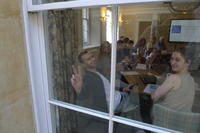It would be no exaggeration to say that the UC Module is the best academic experience I have ever had. So, it is extremely difficult for me to cherry-pick the most interesting lessons that I took away because each day of the Module was so intense that by the end of the week, I had a feeling that I completed an extra term in the university. That is why I would try to focus on some fundamental mind shifts that I was lucky enough to experience.

The first thing that I have learnt during the Module is that I am way behind other UC Fellows in Theory of International Relations. My university puts premium on developing near-encyclopedic knowledge and fails to pay due attention to the theoretical part of the question. That is why I have quickly discovered that all my previous perceptions of Russia-West relations had been strictly limited to a certain event, be it war in South Ossetia in 2008 or current Ukrainian crisis. My mind has been awash with different facts and figures which were supposed to disarm any ‘opponent’ who claims that the Russian perception of a given issue is incorrect. However, it turned out that it is impossible to prove one’s point, especially when it comes to international conflicts, if one sticks only to their own dogma and turns a deaf ear to the other side’s interests. I would not say that the Module has radically changed my views on the key points of Russian foreign policy but it greatly helped me to understand the concerns of Western countries which I previously considered as hypocritical and farfetched.

In this context, I cannot fail to mention my conversation with Julie Newton who came up with a topic of the role of emotions in international relations. It has never occurred to me how emotions can influence one’s perception and Julie gave me much food for thought: what if I was wrong in some of my own assumptions because my emotions prevented me from having an unbiased assessment? We also touched upon the feeling of betrayal which, in my opinion, lies in the heart of the Russia-West crisis in relations. Suddenly I realized that this sense of betrayal nurtures anger, resentment and unwillingness to cooperate both on personal and on state levels. It explained to a certain extent why I considered Western approach as hypocritical and why justifying Russian actions by claiming that “the West did the same thing and remained unpunished” is a road to nowhere. If it is possible, I would like to ask Julie to further expand on this topic in the upcoming modules and conferences.
To sum it up, the Module helped me to get a bigger and more complex picture of Russia-West relations, discover my own weaknesses and gaps in knowledge. It has indeed become a perfect end to my Bachelor’s degree program in International Relations & Area Studies. Moreover, as I stated during the last speaking session with Alex Pravda, the Module has prompted me to reflect upon the choices ahead, notably the choice of a Master’s degree program that I am to make in the next few weeks. So, I would like to thank once again all the speakers, organizers and my dearest friends, other UC-Fellows for making all this real. You have unique inspiring power that brings people with opposite views together.